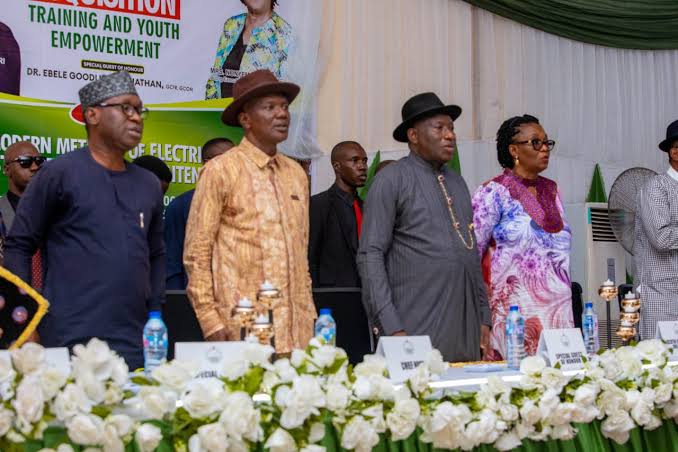Former President Goodluck Jonathan, and Bayelsa State Governor, Senator Douye Diri, have cautioned trainees taking part in the four-day skills acquisition training programme organized by the National Agency for Science and Engineering Infrastructure (NASENI) not to sell off their starter packs at the end of the exercise.
The two leaders, who made the call at the opening ceremony of the training programme holding at the Federal University, Otuoke, in Ogbia Local Government Area of the State on Tuesday, noted that the success of the programme largely depends on the attitude of the beneficiaries.
Speaking as special guest at the event, Dr. Goodluck Jonathan commended President Muhammadu Buhari for giving his approval for the training exercise which draws participants from all the three senatorial districts in the state.
While calling on NASENI and the Local Content Board to establish a functional institute in Bayelsa for quality training in the oil and gas and other critical areas, the former President stressed that vocational skills training was the way to go for Nigeria to meet its industrial development target.
He, however, sounded a note of warning that the objective of NASENI would be defeated if the trainees sell off their working materials procured for them.
Dr Jonathan said: “While I join others to call on NASENI to increase the number of trainees, I’m mindful and more interested in the quality of the training.
“I’m happy to hear from the CEO of NASENI that they are planning to set up an Oil and Gas Engineering Materials Development Institute in Bayelsa State.
” So, now that President Buhari has mandated me to coordinate your (NASENI) activities, I urge the two of you (NASENI and NCDMB) to work together to make sure that one excellent and functional training centre is built in Bayelsa.
“That will help to churn out our youth every one or two years so that after a period of 5 to 10 years, we will have enough people to work in the industrial parks that are being built.”
On his part, Governor Douye Diri urged governments at all levels to strive to build a massive pool of highly skilled manpower to drive the nation’s industrial development.
Governor Diri who spoke at the event through his Deputy, Senator Lawrence Ewhrudjakpo, disclosed that his administration had trained thousands of youths through its skills acquisition and training programme in the state so far.
The Bayelsa state governor, who called on the beneficiaries to take the training seriously, tasked NASENI to follow up and track the beneficiaries to ensure that the starter packs that would be given out did not end in markets.
He commended the NASENI for putting up the four-day specialized youth training and empowerment programme together in the state, and advised the Agency to partner the Nigerian Content Development and Monitoring Board (NCDMB) on capacity-building programmes for youths.
His words: “A foolish man sells his seed; a reasonable man eats his seed, while the wise man plants his seeds. You are here today with a seed in your hand.
“If you plant this seed, it will germinate, bear fruits and you will become a seller of fruits. If you eat this seed, your stomach will be full but after some time, you will visit the toilet and that will be the end of it.
“If you sell it, you will get some money and spend and that will be the end, and you will never be a seller of fruits. So, you need to know what you are here for.”
Earlier in his remarks, the Executive Secretary of the NCDMB, Engineer Simbi Wabote, remarked that specialized youth training was critical to the industrial development of the country.
Describing the theme of the training programme, “Modern Methods of Electrical Installations and Maintenance” as apt, Wabote commended the NASENI for the capacity-building exercise aimed at promoting economic development through science, technology and engineering.
In her welcome address, the Acting Executive Vice Chairman of the NASENI, Mrs. Nonyem Onyechi, said the first phase of the programme was aimed at training 100 Bayelsa youths, as a step towards the fourth Industrial Revolution.







